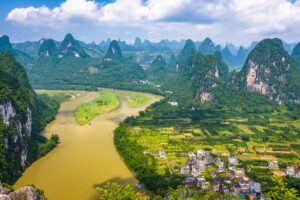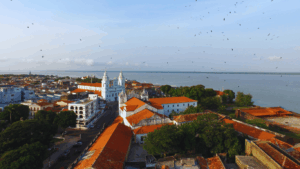Shared aquifers: The international community comes together
There are now 468 transboundary aquifers identified, covering – or underlying – almost all nations. This was presented at UNESCO’s conference on International Shared Aquifer Resources Management (ISARM), on 6–9 December 2021.

The International Centre for Water Cooperation (ICWC) contributed to the second ISARM conference, organized as a hybrid event from UNESCO headquarters in Paris. The conference aim to “showcase the diverse efforts of UNESCO and the international community to streamline groundwater as an enabler for achieving the water-related SDGs.” It focused on challenges and the way forward of managing transboundary aquifers.
For ICWC, SIWI’s Dr Jenny Grönwall presented a case study of Ethiopia exporting groundwater to Djibouti based on an agreement that involves the government of China as the financier. The project site is adjacent to the Afar Rift Valley / Afar Triangle Aquifer being shared by Ethiopia and Djibouti. Yet the boundaries of valley and aquifer are still unconfirmed. It, raises the question of whether the groundwater abstracted could be from the same aquifer system. This also makes an interesting case to analyse from the perspective of international cooperation.
“The legal aspects on the management and use of shared groundwater resources are far from satisfactory, but there is important progress” said Dr Grönwall. Of the 468 transboundary groundwater aquifers now identified in the world, only eight are subject to agreements on their management and use.
International Centre for Water Cooperation
ICWC was established in 2014 as an independent research institution through a tripartite agreement among UNESCO, the government of Sweden and SIWI. It focuses on transboundary water management in connection with peace, conflict, and regional development.
Know more about ICWC“In the absence of binding international law on transboundary aquifers, ISARM contributes a critical platform for presenting cases and discussing policy matters to further international cooperation.”
ISARM is an initiative led by UNESCO-IHP and the International Association of Hydrologists (IAH) aimed at improving the understanding of scientific, socio-economic, legal, institutional, and environmental issues related to the management of transboundary aquifers. The first conference was held in 2010.
ICWC, hosted by SIWI under the auspices of UNESCO, aims to contribute to sustainable governance and management of shared waters by improving cooperation on such resources. Groundwater, as well as transboundary aquifers, are thereby in focus and ICWC contributed to the ISARM 2021 in several ways.
Participating and contributing to the ISARM 2021 was a constructive way for ICWC to engage further in transboundary groundwater governance matters. Globally, there are clearly wide knowledge gaps to fill, both technical and managerial, to find ways for sustainable management of the crucial resource that groundwater consist of for socio-economic development globally.
Dr Mats Eriksson and Ms Karin Gardes contributed through chairing of sessions and providing information on how the World Water Week in 2022 – with its theme ‘Seeing the Unseen: The Value of Water’ – will present opportunities for continued deliberations on invisible groundwater resources.
Groundwater and transboundary aquifers
Groundwater constitutes 97 per cent of all liquid freshwater, making it the most abundant source of water available on the planet. Groundwater is therefore crucial to socio-ecological systems, especially as it provides a source of freshwater for around half the world’s population.
While nations establish their limits by political boundaries, aquifers are delimited by their hydrogeological dynamics. Understanding transboundary aquifers is further complicated by the socio-political and territorial issues that arise around their development and protection. Governance and cooperation are sometimes also of essence to confirm their very existence.







